
Morocco! From the dunes of the desert to the labyrinthine medinas and breathtaking landscapes, you’ll experience unforgettable moments. Discover the secrets of this fascinating country, where history meets nature and the warm welcome of the locals will make you feel right at home.
Best Time to Visit
The ideal time to visit Morocco depends on your preferences and planned activities:
- Spring (March to May) and Autumn (September to November): These are the best seasons for comfortable temperatures and fewer crowds.
- Summer (June to August): Ideal for coastal areas but can be extremely hot inland.
- Winter (December to February): Perfect for desert trips but can be cold in the mountains.
Marrakesh
The “Red City” is a feast for the senses:
- Explore the labyrinthine medina, a UNESCO World Heritage site
- Visit the iconic Koutoubia Mosque
- Experience the vibrant Djemaa el-Fna square
- Relax in the serene Jardin Majorelle
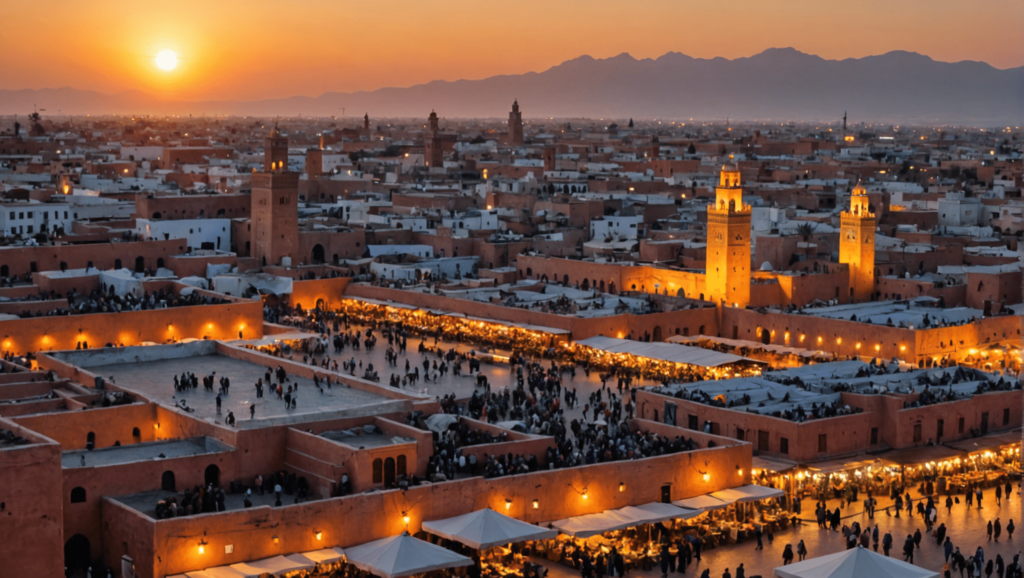
Fez
Step back in time in Morocco’s cultural capital:
- Wander through the medieval Fez el Bali medina
- Visit the historic University of Al Quaraouiyine
- Explore the aromatic tanneries
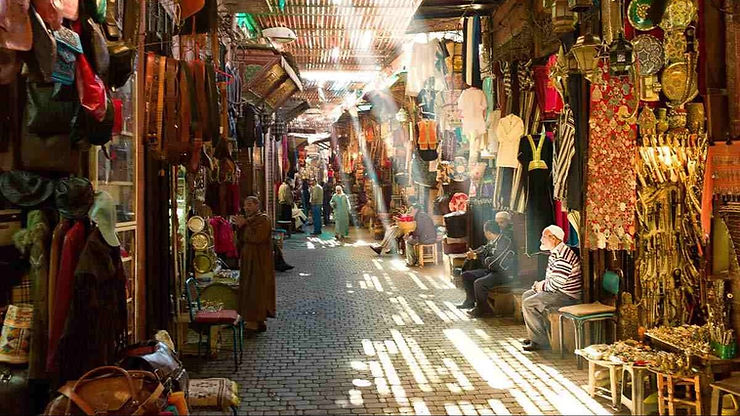
Chefchaouen
Known as the “Blue Pearl” of Morocco:
- Marvel at the blue-washed buildings
- Hike in the nearby Rif Mountains
- Shop for unique handicrafts in the medina
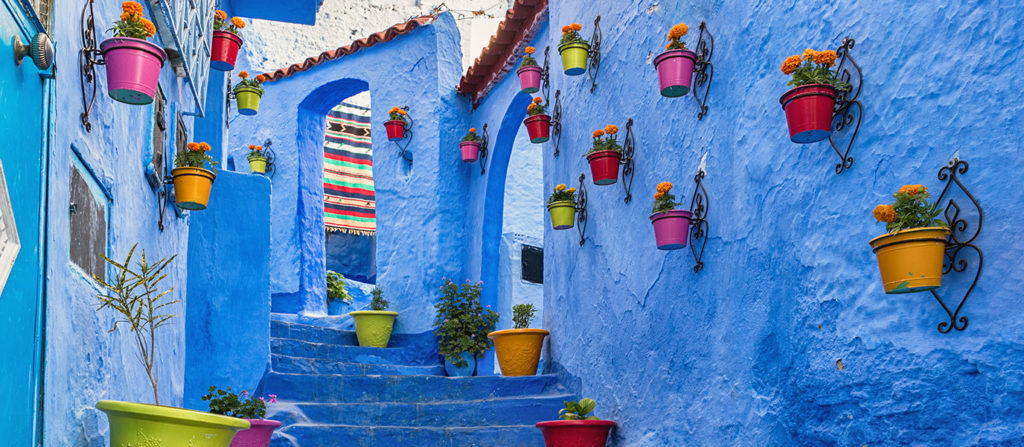
Essaouira
A charming coastal town known for its laid-back atmosphere:
- Stroll along the picturesque port and ramparts
- Try windsurfing or kitesurfing
- Explore the medina and its artisan workshops
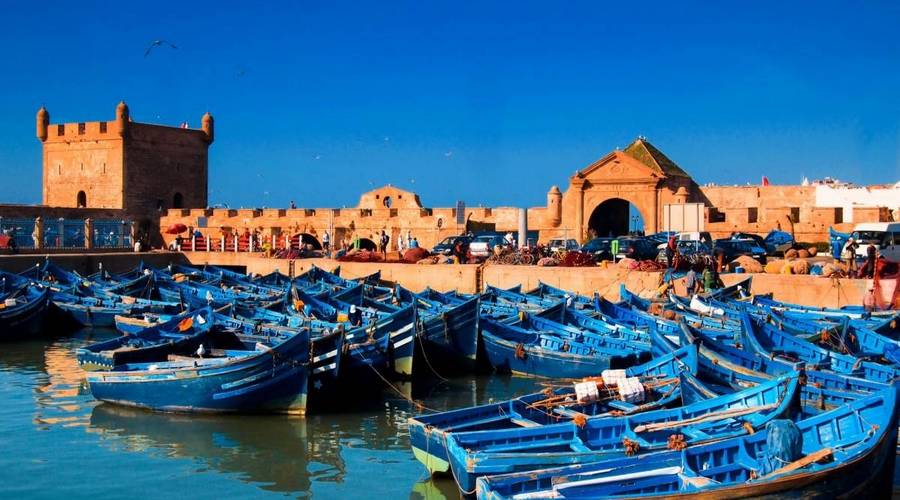
Sahara Desert
Experience the magic of the world’s largest hot desert:
- Take a camel trek into the dunes
- Spend a night in a traditional Berber camp
- Witness breathtaking sunrises and sunsets
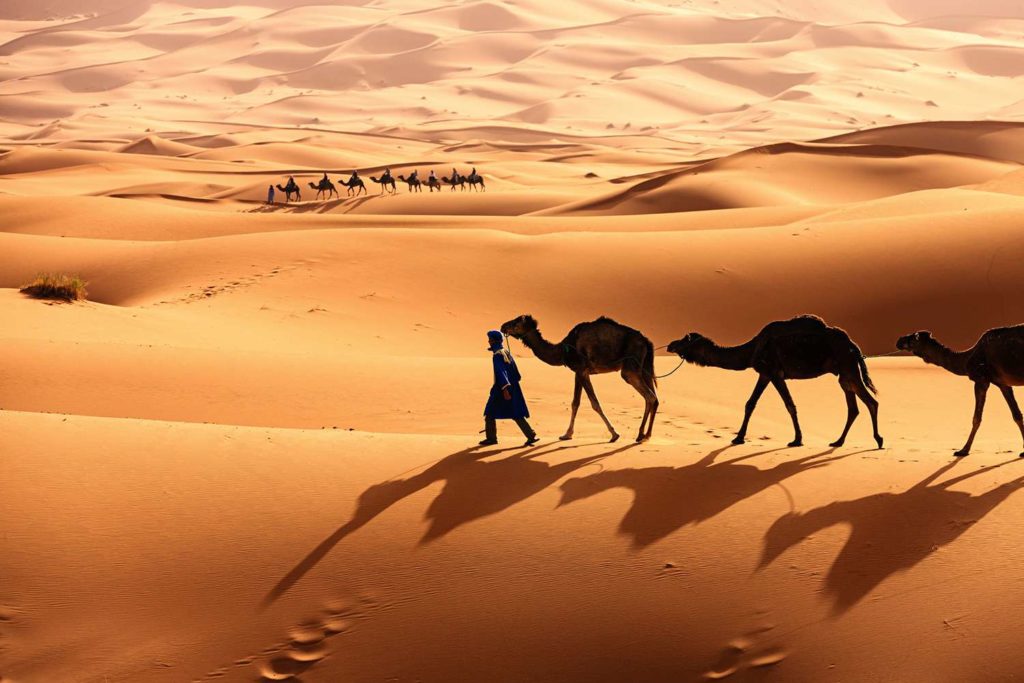
Casablanca
la capitale économique du Maroc, est une ville dynamique et cosmopolite située sur la côte atlantique.
Connue pour son architecture moderne, sa scène artistique vibrante et sa culture riche, Casablanca offre une expérience unique aux visiteurs.
Lieux incontournables
- La mosquée Hassan II : Un chef-d’œuvre architectural moderne, considérée comme l’une des plus grandes mosquées du monde.
- La place Mohammed V : Une vaste place centrale bordée de beaux bâtiments coloniaux, idéale pour se détendre et observer la vie locale.
- La médina : Un labyrinthe de ruelles étroites et colorées, où vous pourrez découvrir l’artisanat local, les souks animés et la vie quotidienne des Casablancais.
- Le quartier Art Déco : Un quartier historique avec une belle architecture Art Déco, abritant des cafés, des restaurants et des boutiques.
- La corniche : Une promenade en bord de mer offrant de magnifiques vues sur l’océan Atlantique.
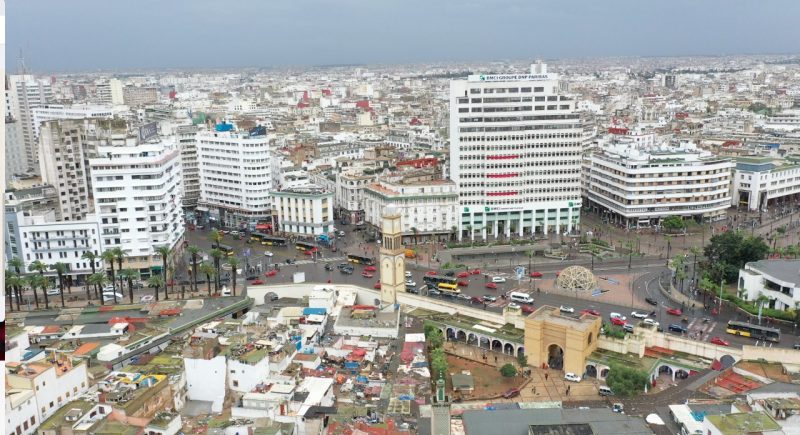
Moroccan Cuisine: A Culinary Adventure
- Tagine: A slow-cooked stew in a conical pot, perfect for sharing.
- Couscous: A fluffy grain often served with vegetables and meat.
- Mint Tea: A refreshing national drink, known as "Moroccan whiskey."
- Pastilla: A sweet and savory pie, traditionally made with pigeon.
Cultural Tips:
- Dress modestly, especially at religious sites.
- Learn a few basic Arabic or French phrases.
- Always ask permission before taking photos.
- Bargaining is expected in souks, but be respectful.
Transportation:
- Trains: Comfortable and efficient for travel between major cities.
- Buses: A widespread network for reaching most destinations.
- Grand Taxis: Shared taxis for intercity travel.
- Petit Taxis: For getting around within cities.
Accommodation:
- Riads: Traditional Moroccan houses with central courtyards.
- Luxury Resorts: Especially in Marrakech and coastal areas.
- Mountain Lodges: For a cozy stay in the Atlas Mountains.
- Desert Camps: For a unique Saharan experience.
Adventure Activities:
- Hiking and mountain biking in the Atlas Mountains.
- Sandboarding in the Sahara Desert.
- Surfing in Taghazout.
- Rock climbing in the Todra Gorge.
Shopping:
- Colorful textiles and carpets
- Leather goods
- Ceramics and pottery
- Spices and argan oil
Many visitors can enter Morocco without a visa for stays up to 90 days. Always check the latest requirements before traveling.
Visa Information for Morocco
Visa Requirements:
- Visa requirements vary depending on your nationality.
- Most foreign nationals need a visa to enter Morocco.
- Some countries may be exempt for short-term stays.
Types of Visas:
- Tourist Visa: The most common, allowing for short-term visits for tourism or business.
- Long-Stay Visa: For extended stays, studies, or work.
- Transit Visa: If you’re merely passing through Morocco to reach another destination.
How to Apply:
- Online: Many nationalities can now apply for an electronic visa (e-Visa) through the official Moroccan government website: www.acces-maroc.ma
- Embassy or Consulate: If an e-Visa isn’t available, visit the nearest Moroccan embassy or consulate in your home country.
FAQs for your Morocco travel guide!
Travel and Transportation
-
What is the best way to get around Morocco?
- Morocco offers a variety of transportation options, including trains, buses, grand taxis, petit taxis, and car rentals. Each has its own advantages depending on your itinerary.
-
Are there any internal flights within Morocco?
- Yes, Royal Air Maroc offers domestic flights between major cities. It’s a convenient option for long distances.
-
How safe is it to drive in Morocco?
- Driving in Morocco can be challenging due to traffic, road conditions, and local driving habits. It’s advisable to hire a driver with a guide for long-distance trips.
Accommodation
-
What are the different
types of accommodations available in Morocco?
- Morocco offers a range of accommodations, from traditional riads and luxury hotels to budget-friendly hostels and desert camps.
-
Are there any specific
areas to avoid when booking accommodation?
- While Morocco is generally safe, it’s advisable to research specific areas, especially in larger cities, and read reviews before booking.
Safety and Health
-
Is it safe to travel to
Morocco?
- Morocco is generally a safe country for travelers. However, it’s always a good idea to take standard precautions, such as being aware of your surroundings and avoiding isolated areas at night.
-
What vaccinations are
recommended for travel to Morocco?
- While no vaccinations are strictly required, it’s recommended to consult with a healthcare professional to discuss potential risks and recommended vaccinations based on your itinerary.
Culture and Etiquette
-
What are some basic
Arabic phrases I should know?
- Learning a few basic Arabic phrases can enhance your experience and show respect for the local culture. Some useful phrases include "hello," "thank you," and "please."
-
What is the dress code like in Morocco?
- While Morocco is a relatively relaxed country, it’s advisable to dress modestly, especially when visiting religious sites.
Food and Drink
-
Is tap water safe to
drink in Morocco?
- It’s generally not recommended to drink tap water in Morocco. Bottled water is readily available.
-
What are some traditional Moroccan dishes to try?
- Beyond tagines and couscous, try local specialties like harira (a hearty soup), msemen (pancakes), and rfissa (a chicken dish).
Activities and Attractions
-
What are the best
places to go hiking in Morocco?
- The Atlas Mountains offer numerous hiking opportunities, including the Toubkal National Park.
-
What are the best places to go surfing in Morocco?
- Taghazout is a popular surfing destination, known for its consistent waves.
Be the first to comment